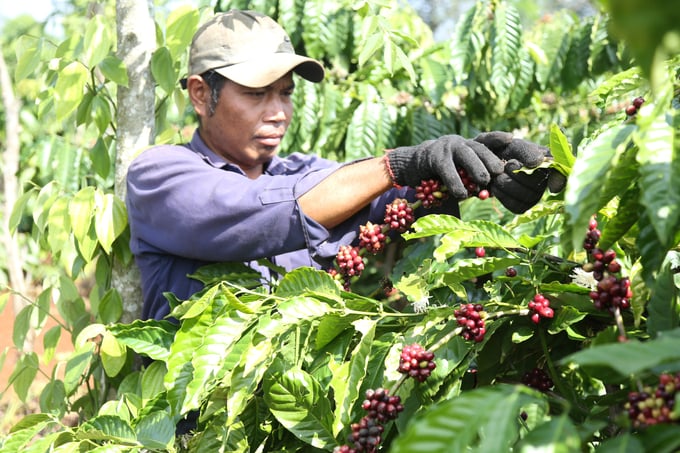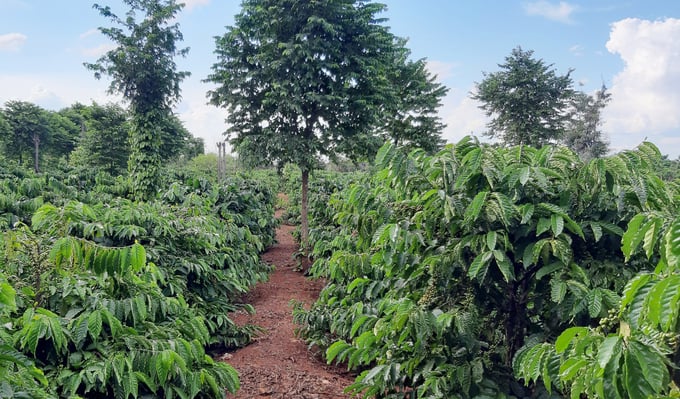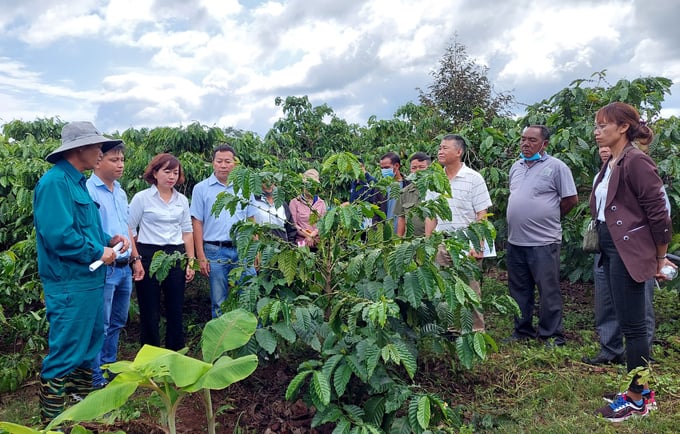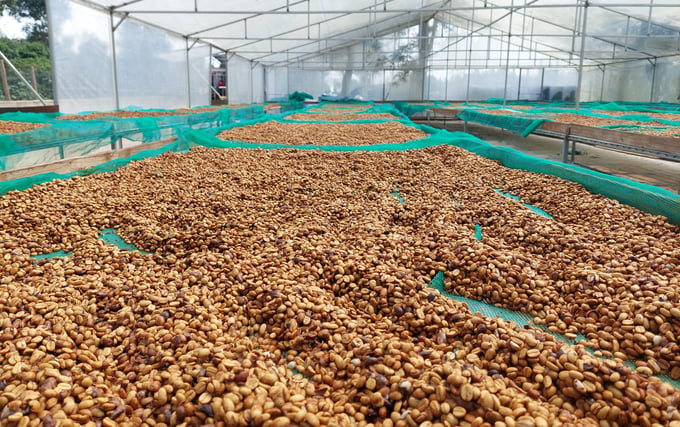May 16, 2025 | 13:53 GMT +7
May 16, 2025 | 13:53 GMT +7
Hotline: 0913.378.918
May 16, 2025 | 13:53 GMT +7
Hotline: 0913.378.918
Dak Lak and Dak Nong are two provinces with the largest coffee production areas in Vietnam. The local governments of these two Central Highlands provinces agreed that the European Anti-Deforestation Regulation or EUDR will provide a challenge as well as an opportunity for the local coffee industry to develop.
According to the EUDR, importers and their supply chain partners are required to demonstrate that their products are not linked to deforestation or forest degradation after December 31, 2020. Under the EUDR, all coffee products entering the Europe are required to provide GPS coordinates or polygons of their production farms. If signs of forest deforestation or degradation is detected using these monitoring tools, the coffee shipment will be returned to the exporter.
Dak Lak province is currently the coffee capital of Vietnam with 213,336 hectares of coffee production area and an annual output of over 526,700 tons. Coffee is a key agricultural product in the economic structure of Dak Lak province, accounting for a significant proportion of the province's total social product and annual export turnover. However, Dak Lak's coffee industry faces increasing challenges in terms of market requirements as importing countries strengthen their regulations.

Coffee is a key product in generating income for the people of Dak Lak and Dak Nong provinces. Photo: Quang Yen.
In order to meet the requirements of the global development trend, Dak Lak province has implemented certified sustainable coffee production programs such as 4C, UTZ, RFA, FLO, and organic coffee production.
Most notably, twelve companies in Dak Lak province were granted the right to use the "Buon Ma Thuot Coffee" geographical indication for green coffee. The total production area for this coffee is 20,326 hectares, with a registered output of 39,890 tons per year. Seven companies were granted the right to use the "Buon Ma Thuot Coffee" geographical indication for roasted and ground coffee, including 193 tons of roasted coffee beans, 125 tons of ground coffee, and 2,000 tons of pure instant coffee. This is also the first coffee geographical indication to be protected in Vietnam as well as 32 countries and territories around the world.
According to Dak Lak province's Department of Agriculture and Rural Development, the implementation of sustainable coffee development programs and projects has greatly contributed to meeting the increasingly strict requirements from importing countries. Furthermore, these activities has helped Dak Lak's coffee industry to develop sustainably.
According to Dak Nong province's Department of Agriculture and Rural Development, agriculture accounts for a large proportion (nearly 38%) of its economic structure. Accordingly, coffee production occupies an area of nearly 138,000 hectares, with an output of nearly 350,000 tons per crop. However, the majority of coffee production area in Dak Nong province originates from former forestry land area. A large portion of these areas have been cultivated for coffee production, despite being included in the province's forest land planning.
As a result, these areas are not eligible for land use right certificates. These factors prevent Dak Nong province's agricultural products from entering the European market.

EUDR provides a challenge as well as an opportunity to develop the coffee industry. Photo: Quang Yen.
According to Mr. Nguyen Xuan Loi, General Director of An Thai Investment and Development Joint Stock Company, the EUDR may poses as a challenge to other countries due to their overlapping coffee production areas and forest land. On the other hand, coffee production areas in Dak Lak and Dak Nong provinces have been planned for long-term and sustainable coffee production with almost no new area.
Consequently, the EUDR will be an opportunity to develop the coffee industry in a sustainable manner, improving both quality and deep processing capacity.
“Businesses have proactively planned and responded to these new opportunities, focusing on effectively updating information regarding export markets. Local governments must also implement solutions to ensure that fluctuations in the coffee market do not conflict with EU regulations.
In addition, all information channels must maintain effective communication, especially in training activities for exporting businesses. Most importantly, these channels must warn farmers that violations will affect the local coffee brand as well as the image of Vietnam in the global market", Mr. Loi explained.
Mr. Nguyen Hoai Duong, Director of Dak Lak province's Department of Agriculture and Rural Development, assessed that the EUDR aims to reduce the risk that products associated with forests are imported into the EU, or exported from the EU.
The EUDR has minimal impact on coffee production in Dak Lak province as well as in Vietnam because it is retroactive from 2020 onwards, whereas coffee production in Dak Lak province has grown steadily over many years. On the other hand, the EUDR coincides with Vietnam's policies on forest protection and coffee development.

Local governments are developing plans to adapt to the EUDR. Accordingly, they will inform businesses and farmers on the benefits and challenges of the new regulations. Photo: Quang Yen.
“The province will consult the Ministry of Agriculture and Rural Development to establish a unified policy in preparation for the EUDR. Dak Lak province will also review and re-evaluate the entire production chain to prepare certifications for regions eligible for the new regulations. Subsequently, when the EUDR enters into effect, Dak Lak province is legally ready to export its products. These new regulations also serve as warnings to prevent deforestation for production land or using land derived from deforestation", emphasized Mr. Duong.
Mr. Pham Tuan Anh, Director of Dak Nong province's Department of Agriculture and Rural Development, reported that stakeholders are allowed 18 months to prepare for the EUDR.
According to Mr. Tuan Anh, in order to assist the coffee industry and key production areas in meeting EUDR requirements, the Department of Agriculture and Rural Development is coordinating with the Sustainable Trade Initiative of Vietnam (IDH) to complete the pilot implementation plan in Dak Nong province. The province also helps businesses and farmers in accessing information regarding new EU regulations in order to establish a favorable legal corridor for exports and avoid potential violations.
The Department of Agriculture and Rural Development has requested the Department of Forest Protection to strengthen the management and protection of forests in order to promptly detect, and handle illegal deforestation.

Local governments are confident that the EUDR will help the coffee industry develop sustainably. Photo: Quang Yen.
“The Department is preparing relevant information including location, area, and subjects of illegal deforestation after December 31, 2020. These data will support the traceability of agricultural products exported to the Europe at the request of competent authorities", Mr. Tuan Anh explained.
He added that the Department of Agriculture and Rural Development requested specialized agencies to advise on a plan for granting and managing production unit codes. Accordingly, the Sub-Department of Agriculture Development is responsible for formulating plans and roadmaps on forming raw material areas. These areas must be connected to the commodity chain, with priority given to EU regulations. Additionally, the Department will focus on the synchronization of databases with regards to farms, traceability information, etc.
“The unit is encouraging businesses, cooperatives and cooperative groups to develop production along the value chain. Businesses, cooperatives and farmers should deploy solutions to promote the utilization of agricultural by-products and wastes for organic production, creating products that meet European standards", emphasized Mr. Tuan Anh.
Translated by Nguyen Hai Long

(VAN) Cold-barn systems efficiently manage environmental and temperature conditions, which aids in the prevention of respiratory diseases in pigs and protects them from the vectors that transmit African swine fevers.

(VAN) To tackle challenges, the project 'Addressing key technical bottlenecks in the grouper supply chain in Vietnam' has been underway since 2024.

(VAN) The project 'Disease-Resilient and Sustainable Cassava Production Systems in the Mekong Region', funded by the Australian Center for International Agricultural Research (ACIAR), is being implemented from 2024 to 2028.

(VAN) Data from 10,000 farming households will help professionalize production organization and support the implementation of the One Million Hectares Program for High-Quality, Low-Emission Rice Cultivation.

(VAN) FAO Director-General QU Dongyu marks International Day of Plant Health at NENA conference.

(VAN) Deputy Minister of Agriculture and Environment Hoang Trung affirmed that floriculture and ornamental plants are a growing industry that receives significant global attention.

(VAN) The three staple crops dominating modern diets – corn, rice and wheat – are familiar to Americans. However, fourth place is held by a dark horse: cassava.